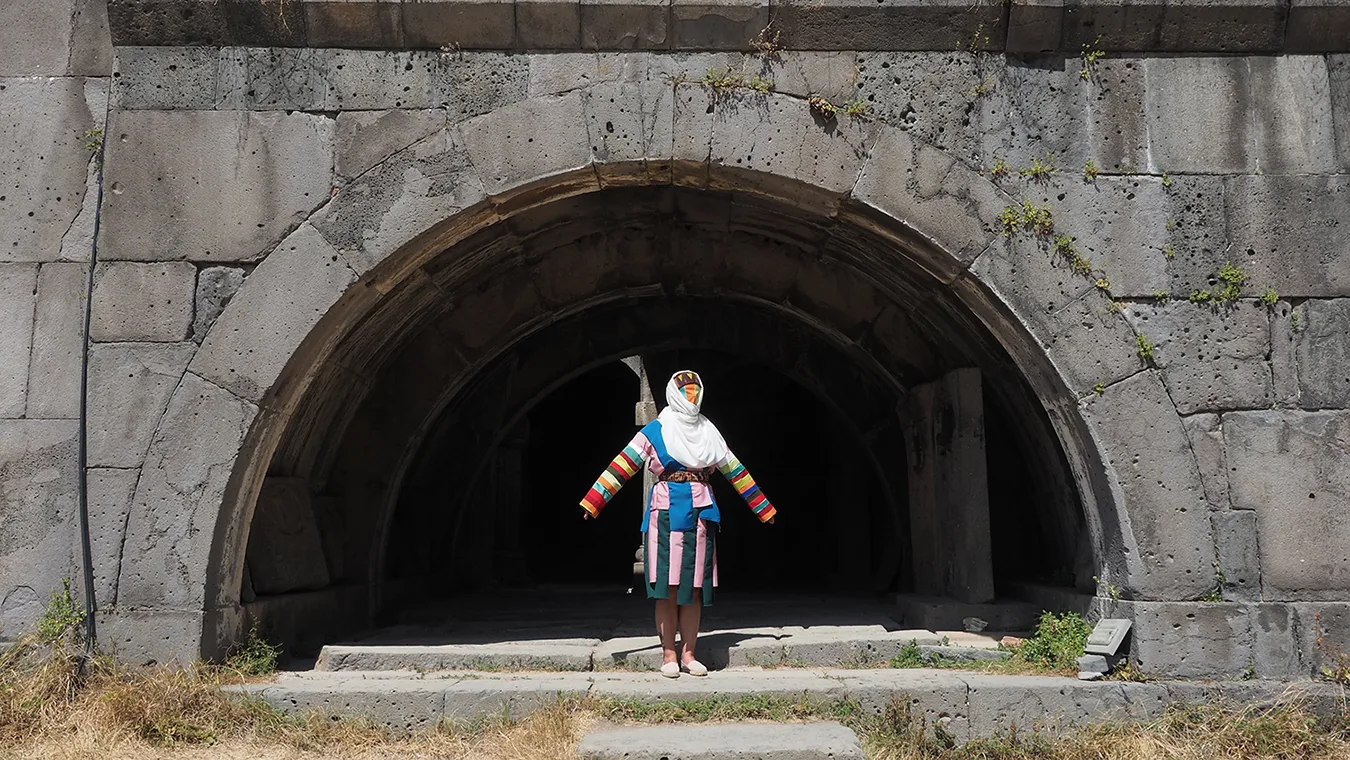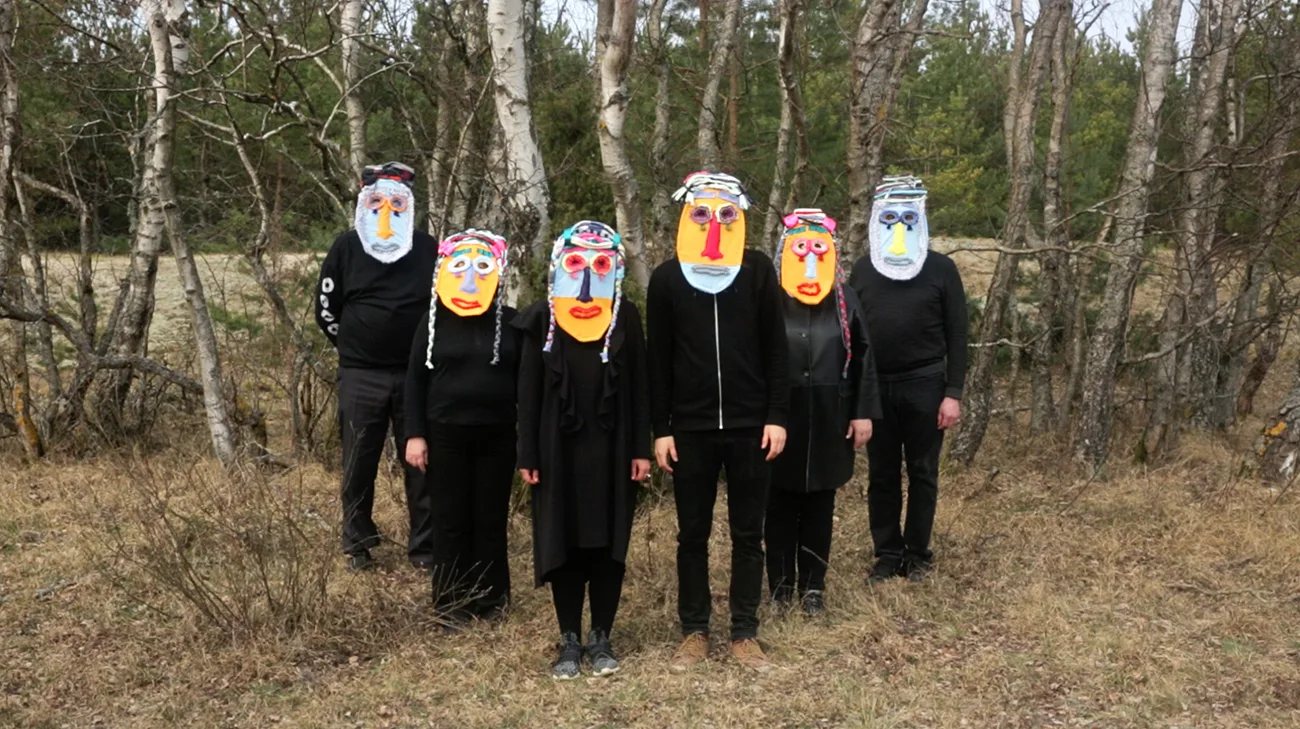

Each of Russian artist Lyuba Matyunina’s masks is inspired by something that leaps out to her about the culture of a place on her travels, whether that’s Japan’s supernatural, folkloric monsters or the coastal beauty of the Caribbean. Here, she walks Alix-Rose Cowie through the stories behind four of her favorites.
Born in Kaliningrad, artist Lyuba Matyunina was seven years old when the Soviet Union was dissolved. She remembers the price of ice cream shot up – her main concern – and that chewing gum was now widely available (and no longer made you the coolest kid in town if you could get your hands on it). Jeans and other clothes that she’d only seen in movies started arriving in the country. Still, growing up she felt limited by the clothing options available to express herself the way she wanted to. Instead she’d combine what she had in interesting ways and customize her mum’s old clothes. She still loves thrifting and tweaking her finds to suit her style.
Vintage and secondhand shops are a big part of Lyuba’s art practice today. It’s where she sources the fabric to make the colorful, outlandish masks and costumes worn in her photographs and short films inspired by fairytales and folklore.
Though based in Amsterdam, Lyuba has made work all over the world – from Japan to Aruba – at art residencies or as a visiting teacher. Wherever she goes, she researches the myths and tales told in that place as inspiration for the characters she builds and the masks they wear. Lyuba is fascinated by Joseph Campbell’s theory of artists as shamans who create the myths that reflect our reality. “Shamans use masks to travel to different realities, to travel to different worlds,” she says, “And in a way I do the same through my artwork.”
Sewing and embellishing the masks by hand is also a kind of ritual for Lyuba. She’ll only work on one when she’s in a joyful mood so it’s infused with good energy.
In the fairytales she creates, Lyuba sees the viewer as the hero. Her masked characters represent good or evil. “For some people they’ll be scary and for others they’ll be something shamanistic or magic,” she says. Like embarking on a journey at the beginning of any good story, Lyuba’s work offers an experience to go through. “All the masks are spirits, helpers, advisors or evil characters which you meet on the way.”
Lyuba sees fairytales as powerful lessons on how to get through difficult times. “It’s an ancient way to transfer the traditions of the tribe or the nation but if you look deeper it’s always about this personal quest of the hero who goes through certain difficulties, who fights demons and then returns to his village with some secrets of life which he shares with his community,” she says. In Joseph Campbell’s 1949 book The Hero with a Thousand Faces, he analyses the archetypal hero’s journey and finds parallels throughout literature and folklore. “I find it amazing that you can look at any fairytale from any country and it’s all about that in a different form,” Lyuba says. “This is what I like the most.”


Yōkai (Japan)
On residency in a Japanese village, Lyuba learnt about yōkai, the supernatural monsters or spirits of local folklore. After discovering a vintage shop selling old kimonos on the cheap – “I was going there every second day, just to hang out and touch them” – she was inspired to repurpose the garments to create her own versions of these characters. “I believe a lot of Japanese would read these myths in a completely different way to how I look at them,” she says. One of the masks in the series is inspired by Rokurokubi, a type of yōkai characterized by its long, stretchy neck. Lyuba wore the costume herself for the photograph; it took an hour to get the shot under three or four layers of kimonos at the height of summer. Another costume was a version of Hyakume, whose body is covered with countless blinking, yellow eyes. “Local people loved the project which was the best compliment for me because it’s their mythology and their culture.”
For some people they’ll be scary and for others they’ll be something shamanistic or magic.

Carpetologia (Armenia)
Lyuba went to Armenia to make a film about carpets. “I look at carpets as a representation of life stories, where each decision, each step you take, each human you meet is one stitch or one color you use in the pattern of life,” she says. The costumes and masks she created were adapted from patterns and colors found in Armenian carpets and the scarves of the national dress. “Armenia is so colorful, so any color you choose is there in nature,” she says. “Originally carpets were made using natural dyes; the color of pomegranates or grapes.” For Mother Nature, she was inspired by a pattern from the 19th century called “apple” which looks like a cross section of the fruit. It also reminded her of a womb.

Portable Homelands (Russia)
In this group portrait Lyuba and her partner, fellow artist Konstantin Guz, stand in the center. Behind her are her mother and father and behind him are his. It was shot in a village called Morskoe in The Curonian Spit national park on the border of Lithuania, a place they both visited in the summer as kids. Lyuba calls it her “power place” and it’s where her parents met and fell in love. In the photograph, each of the family members wears a mask. “This work is about identity, about motherland, about home. What it means to belong to a certain land,” Lyuba says. She and Konstantin moved all the furniture out of their living room to show the work in Amsterdam. Together with this photograph and video interviews with their parents, they created an extended family tree on their lounge wall with pictures of their grandparents and great grandparents superimposed with masks. “It was very personal work but because we’re all wearing masks it becomes universal,” Lyuba says. “We had people come to see it from different countries and backgrounds and everyone started to talk about their family. Masks can be used as a tool to make this universal connection.”
Shamans use masks to travel to different realities, to travel to different worlds.


Alma di Isla (Aruba)
“Nobody in Aruba could really tell me about any one piece of mythology there, because it’s an island with a really sad colonial history,” Lyuba says. “On the one hand I found this extremely sad but on the other I found it inspiring in that I was free to make it up as I went.” She created a series of masks inspired by the natural wonder of the Caribbean island; the ocean, the mangroves and the coral. She filmed them in a small national park away from the hotels and tourists. She found another kind of paradise through the backdoor of a major department store selling clothing and textiles at huge discounts, and she used these to make the masks.

